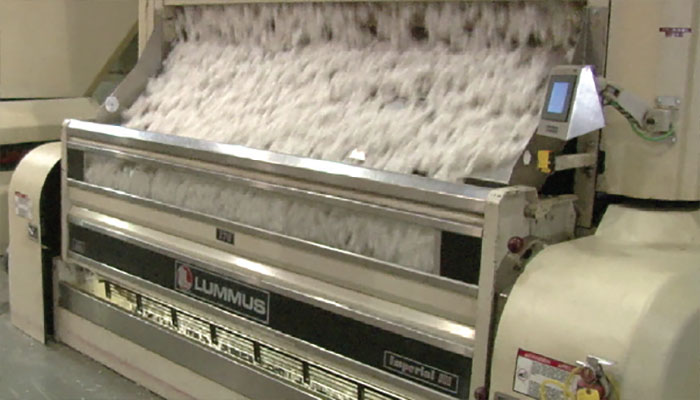Cotton trade drops amid higher price demand by ginners
KARACHI: As expected, ginners are demanding higher prices from buyers due to shortage cotton bales in the market with their stocks down to 70,000 bales, traders said on Saturday.
With cotton production having declined around 40 percent, ginners are demanding higher prices, as very little stock of around 70,000 bales is left with them, traders said.
Spinners were less interested in the purchase of lint from the local market during the outgoing week. They are not ready to purchase lint at higher rates, although prices remained stable in the local market amid low volumes.
During the outgoing week, trade volumes remained very low in the local cotton market. Cotton prices in Sindh remained at Rs10,200 per maund to Rs10,700 per maund while lint from Punjab fetched rates of Rs10,800 to Rs11,500 per maund.
Spot rate committee of Karachi Cotton Association kept the spot rate was unchanged at Rs10,800 per maund.
During the current season, there was production of only 5.65 million bales in the country, which is lowest production in three decades.
Industry people said cotton production target of 10.5 million bales set by Federal Committee on Agriculture was unrealistic. The country needs better quality seed and pesticides which are not available. Textile mills will face problems during fulfilling their consumption demand.
Tension between spinners and value-added textile sector continued throughout the week over import and prices of cotton yarn.
The value-added textile sector said cotton yarn is not available to them at lower rates and they demanded removal of 5 percent custom duty over its import.
The Economic Coordination Committee in its recent meeting abolished 5 percent custom duty over import of cotton yarn, but the decision would be implemented after approval of the federal cabinet.
After such decision, the value-added sector would be in a position to import cotton yarn without any duty. In December last, 5 percent sales tax on imported yarn was also waived off.
All Pakistan Textile Mills Association said Pakistan produced surplus yarn and it was available in bulk quantity for the use of local mills even after exports.
Karachi Cotton Brokers Association Chairman Naseem Usman told The News that prices in the international market showed increasing trend during the outgoing week. New York Cotton Market witnessed higher rates where May futures closed at higher rates of 85 cents per pound.
According to weekly cotton report of the United States Department of Agriculture, cotton export from the US decreased by 55 percent during the week. The US trade was affected with depreciation in dollar rate while drought like situation had developed in the largest cotton growing Texas State.
Cotton prices also increased in China, Brazil, Central Asia, Argentina and India during the outgoing week.
New cotton season has started in Pakistan where sowing is in full swing in lower Sindh while it has also begun in those Punjab areas where wheat has been harvested.
-
 ByteDance’s New AI Video Model ‘Seedance 2.0’ Goes Viral
ByteDance’s New AI Video Model ‘Seedance 2.0’ Goes Viral -
 Archaeologists Unearthed Possible Fragments Of Hannibal’s War Elephant In Spain
Archaeologists Unearthed Possible Fragments Of Hannibal’s War Elephant In Spain -
 Khloe Kardashian Reveals Why She Slapped Ex Tristan Thompson
Khloe Kardashian Reveals Why She Slapped Ex Tristan Thompson -
 ‘The Distance’ Song Mastermind, Late Greg Brown Receives Tributes
‘The Distance’ Song Mastermind, Late Greg Brown Receives Tributes -
 Taylor Armstrong Walks Back Remarks On Bad Bunny's Super Bowl Show
Taylor Armstrong Walks Back Remarks On Bad Bunny's Super Bowl Show -
 James Van Der Beek's Impact Post Death With Bowel Cancer On The Rise
James Van Der Beek's Impact Post Death With Bowel Cancer On The Rise -
 Pal Exposes Sarah Ferguson’s Plans For Her New Home, Settling Down And Post-Andrew Life
Pal Exposes Sarah Ferguson’s Plans For Her New Home, Settling Down And Post-Andrew Life -
 Blake Lively, Justin Baldoni At Odds With Each Other Over Settlement
Blake Lively, Justin Baldoni At Odds With Each Other Over Settlement -
 Thomas Tuchel Set For England Contract Extension Through Euro 2028
Thomas Tuchel Set For England Contract Extension Through Euro 2028 -
 South Korea Ex-interior Minister Jailed For 7 Years In Martial Law Case
South Korea Ex-interior Minister Jailed For 7 Years In Martial Law Case -
 UK Economy Shows Modest Growth Of 0.1% Amid Ongoing Budget Uncertainty
UK Economy Shows Modest Growth Of 0.1% Amid Ongoing Budget Uncertainty -
 James Van Der Beek's Family Received Strong Financial Help From Actor's Fans
James Van Der Beek's Family Received Strong Financial Help From Actor's Fans -
 Alfonso Ribeiro Vows To Be James Van Der Beek Daughter Godfather
Alfonso Ribeiro Vows To Be James Van Der Beek Daughter Godfather -
 Elon Musk Unveils X Money Beta: ‘Game Changer’ For Digital Payments?
Elon Musk Unveils X Money Beta: ‘Game Changer’ For Digital Payments? -
 Katie Holmes Reacts To James Van Der Beek's Tragic Death: 'I Mourn This Loss'
Katie Holmes Reacts To James Van Der Beek's Tragic Death: 'I Mourn This Loss' -
 Bella Hadid Talks About Suffering From Lyme Disease
Bella Hadid Talks About Suffering From Lyme Disease




